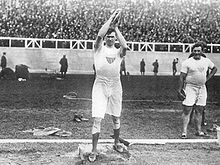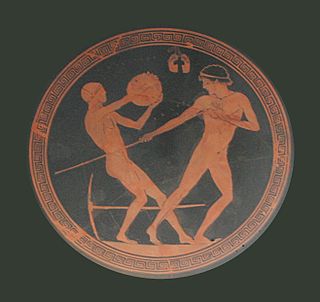
A pentathlon is a contest featuring five events. The name is derived from Greek: combining the words pente (five) and -athlon (competition). The first pentathlon was documented in Ancient Greece and was part of the Ancient Olympic Games. Five events were contested over one day for the Ancient Olympic pentathlon, starting with the long jump, javelin throwing, and discus throwing, followed by the stadion and wrestling. Pentathletes were considered to be among the most skilled athletes, and their training was often part of military service—each of the five events in the pentathlon was thought to be useful in war or battle.

At the 1908 Summer Olympics held in London, England, 26 athletics events were contested, all for men only. A total of 79 medals were awarded.

Athletics has been contested at every Summer Olympics since the birth of the modern Olympic movement at the 1896 Summer Olympics. The athletics program traces its earliest roots to events used in the ancient Greek Olympics. The modern program includes track and field events, road running events, and race walking events. Cross country running was also on the program in earlier editions but it was dropped after the 1924 Summer Olympics.
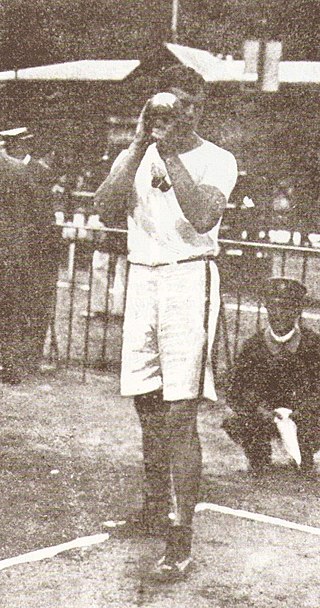
The men's shot put was a track & field athletics event at the 1900 Summer Olympics in Paris. It was held on July 14 and July 15, 1900. 11 shot putters from five nations competed. The event was won by Richard Sheldon of the United States, the nation's second consecutive victory in the men's shot put. Josiah McCracken took silver and Robert Garrett took bronze, completing an American medal sweep.

The men's discus throw was a track & field athletics event at the 1900 Summer Olympics in Paris. It was held on July 14 and July 15, 1900. 17 discus throwers from nine nations competed. The event was won by Rudolf Bauer of Hungary, the nation's first victory in the men's discus throw. František Janda-Suk gave Bohemia its first medal in the event, also in that nation's first appearance. Richard Sheldon's bronze put the United States in the top three for the second consecutive Games.

These are the results of athletics competition at the 1912 Summer Olympics. 30 events were contested, all for men only.

The men's discus throw was one of two throwing events on the Athletics at the 1896 Summer Olympics programme. The discus throw was the fourth event held. It was contested on 6 April. 9 athletes competed, including one each from France, Sweden, the United States, and Great Britain as well as three Greeks and two Danes.

The men's discus throw was one of six throwing events on the Athletics at the 1908 Summer Olympics programme in London. The competition was held on 16 July 1908. 42 throwers from eleven nations competed. NOCs could enter up to 12 athletes. The event was won by Martin Sheridan of the United States, his second consecutive victory in the event. The Americans completed their first sweep in the discus throw, with Merritt Giffin taking silver and Bill Horr bronze.

The men's hammer throw was one of six throwing events on the Athletics at the 1908 Summer Olympics programme in London. The competition was held on July 14, 1908. 19 throwers from eight nations competed. NOCs could enter up to 12 athletes. The event was won by American John Flanagan, his third consecutive victory in the event. He was the first man to win three medals in the hammer throw and, as of the 2016 Games, the only one to win three gold medals in the event. The silver medal went to fellow American Matt McGrath. Con Walsh of Canada took bronze and became the first athlete not from the United States to win a medal in the event, as the Americans had swept the podium in both 1900 and 1904. The three medalists were all part of the Irish Whales.
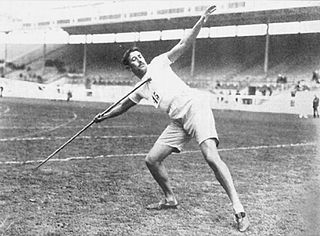
The men's javelin throw was one of six throwing events on the Athletics at the 1908 Summer Olympics programme in London. The javelin was required to be held in the middle. The competition was held on 17 July 1908. 16 throwers from six nations competed. NOCs could enter up to 12 athletes.
The men's freestyle javelin throw was one of six throwing events on the Athletics at the 1908 Summer Olympics programme in London. The javelin could be held anywhere, as opposed to the standard javelin throw which required the javelin to be held by a grip in the middle. This was the only time such a "freestyle" event was held at the Olympics. The competition was held on 15 July 1908. 33 throwers from nine nations competed. NOCs could enter up to 12 athletes.

The men's shot put was one of six throwing events on the Athletics at the 1908 Summer Olympics programme in London. The competition was held on July 16, 1908. 25 shot putters from eight nations competed. NOCs could enter up to 12 athletes. The event was won by Ralph Rose, successfully defending his title from 1904 and making it four consecutive Games that the event was won by an American. The two-Games streak of sweeps in 1900 and 1904 ended, however, as Denis Horgan of Great Britain took silver. Johnny Garrels of the United States took bronze. Rose was the second man to win two medals in the shot put ; Wesley Coe nearly was the third as he ended up in 4th place, only 11 centimetres behind Garrels.
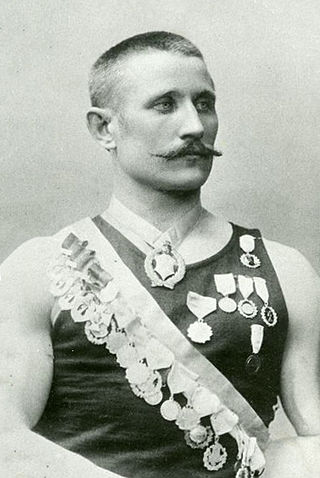
Venne "Verner" Järvinen was a Finnish track and field athlete, who competed mostly in throwing events. He won the gold medal in the Greek-style discus in the 1906 Intercalated Games, and the bronze in the 1908 Summer Olympics, becoming the first Finnish Olympic medalist in athletics. He won the Finnish championship in Greek style discus three times in 1909–1911 and held the national record in discus and hammer throw.

The men's discus throw was a track and field athletics event held as part of the athletics at the 1912 Summer Olympics programme. The competition was held on Friday, July 12, 1912. Forty-one discus throwers from 15 nation competed. NOCs could enter up to 12 athletes. The event was won by Armas Taipale of Finland, the nation's first medal in the men's discus throw. Richard Byrd took silver and James Duncan took bronze to continue the United States' podium streak at five consecutive Games.
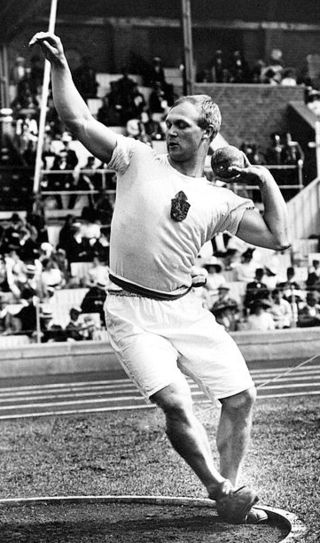
The men's discus throw event was part of the track and field athletics programme at the 1920 Summer Olympics. The competition was held on Saturday, August 21, 1920, and on Sunday, August 22, 1920. 17 discus throwers from eight nations competed. No nation had more than 4 athletes, suggesting the limit had been reduced from the 12 maximum in force in 1908 and 1912. The event was won by Elmer Niklander of Finland, the nation's second consecutive victory in the men's discus throw. Armas Taipale, the winner in 1912, took silver to become the second man to win multiple medals in the event. Gus Pope took bronze, continuing the American streak of podium appearances at all six discus competitions to date.

György Luntzer was a Hungarian track and field athlete and sport wrestler. A three-time Hungarian Athletics Championships winner in the discus throw, he also participated at the 1908 Summer Olympics and the 1912 Summer Olympics, achieving his best result in 1908 by finishing seventh in the discus throw event.

The men's discus throw event was part of the track and field athletics programme at the 1924 Summer Olympics. The competition was held on Sunday, July 13, 1924. 32 discus throwers from 18 nations competed. The maximum number of athletes per nation was four. The event was won by Bud Houser of the United States, the nation's fourth victory in the men's discus throw ; the Americans had medalled in each of the Olympic discus throw events to date. Houser had also won the shot put. Vilho Niittymaa took silver, keeping Finland on the podium in the event for the third straight Games. Thomas Lieb gave the United States its second discus throw medal of 1924, with his bronze.

The discus throw is one of four track and field throwing events held at the Summer Olympics. The men's discus throw has been present on the Olympic athletics programme since 1896. The women's event was first contested at the 1928 Olympics, being one of the five athletics events in the inaugural Olympic women's programme.

The hammer throw at the Summer Olympics is one of four track and field throwing events held at the multi-sport event. The men's hammer throw has been present on the Olympic athletics programme since 1900, becoming the third Olympic throws event after the shot put and discus throw. The women's event was a much later addition, being first contested at the 2000 Olympics.

The javelin throw at the Summer Olympics is one of four track and field throwing events held at the multi-sport event. The men's javelin throw has been present on the Olympic athletics programme since 1908, being the last of the current throwing events to feature at the Olympics after the shot put, discus throw and hammer throw. The women's event was first contested at the 1932 Olympics, becoming the second women's throws event after the discus in 1928.
